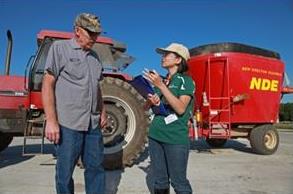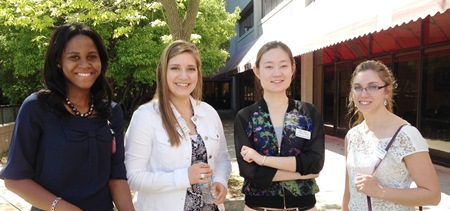![]()
Summer Student Research Internship Program (SSRIP) Research Areas
Agricultural Health and Safety
 The agricultural industry is evolving and increasingly depends on new technology and a workforce that consists largely of immigrant workers. Large animals, mass production processes and machinery are contributing to high rates of injury and illness in dairy. The student intern will learn about the changing agricultural industry in Wisconsin and the challenges resulting from the modernization, corporatization and transition to an immigrant workforce. The student intern will participate in determining hazard abatement strategies on farms, resolving unique hazards and training of immigrant farm workers. Areas of focus could include: Farmer health and safety, farm worker health and safety, emergency preparedness on the farm, illness and injury prevention on the farm, worker training interventions, agricultural industry networking, social media in occupational health and safety, mobile applications in agriculture, and immigration in agriculture. Students who are engaged in the following areas are encouraged to apply for this program: Spanish, social science, education, communication, anthropology, public health, medicine, nursing, social work, occupational health and safety, industrial hygiene and students in agriculture-related majors or with farming backgrounds.
The agricultural industry is evolving and increasingly depends on new technology and a workforce that consists largely of immigrant workers. Large animals, mass production processes and machinery are contributing to high rates of injury and illness in dairy. The student intern will learn about the changing agricultural industry in Wisconsin and the challenges resulting from the modernization, corporatization and transition to an immigrant workforce. The student intern will participate in determining hazard abatement strategies on farms, resolving unique hazards and training of immigrant farm workers. Areas of focus could include: Farmer health and safety, farm worker health and safety, emergency preparedness on the farm, illness and injury prevention on the farm, worker training interventions, agricultural industry networking, social media in occupational health and safety, mobile applications in agriculture, and immigration in agriculture. Students who are engaged in the following areas are encouraged to apply for this program: Spanish, social science, education, communication, anthropology, public health, medicine, nursing, social work, occupational health and safety, industrial hygiene and students in agriculture-related majors or with farming backgrounds.
Students who are engaged in the following areas are encouraged to apply for this program: Spanish, social science, education, communication, anthropology, public health, medicine, nursing, social work, occupational health and safety, industrial hygiene and students in agriculture-related majors or with farming backgrounds.
Biomedical Informatics
The Biomedical Informatics Research Center (BIRC) conducts clinical and translational informatics research. Utilizing electronic health record data, scientists develop predictive models to identify patients at risk of an adverse events. Researchers use machine learning to characterize patients for research studies. BIRC’s software engineering capabilities create state-of-the-art applications in pharmacogenomics, rare disease registries and clinical applications. With over 88 million clinical narratives, natural language processing and intelligent character recognition are used to mine data. Students interested in informatics, machine learning and natural language processing (NLP) will find a summer with BIRC a rewarding and exciting experience.
Undergraduate and graduate students with backgrounds in the following areas are encouraged to apply: informatics, biomedical informatics, and computer science.
Clinical Research
Students interested in Clinical Research typically work on projects that explore relationships or association between the cause of disease and current medical practice with the goal to enhance a better understanding of a disease or disorder. The focus of research projects may include patient-oriented research, epidemiologic and behavioral studies, and outcomes and health services research. Students will also have the opportunity to attend Internal Medicine morning report and medical case-conferences. Students that apply to this program should have an interest in clinical medicine and should have finished at least their Junior-year and are planning to apply to or have applied to medical school or current medical school student.
Cultural/Medical Anthropology
Cultural anthropology is a core unit of study in the National Farm Medicine Center. To facilitate the adoption of safety practices by the farming community safety recommendations must resonate within and not clash with the cultural context of the farmer. At times this presents a substantial challenge. The primary focus of the anthropological projects is to explore methods to sculpt agricultural health and safety and injury prevention messages and messaging into culturally resonant concepts and to enlist trusted farm allies to assist in message development and delivery. Applicants should be particularly interested in conducting fieldwork, recruiting study subjects, conducting literature reviews, as well as learning to apply ethnographic methods and social theory to issues facing agricultural communities. Students interested in applied, cultural, and medical anthropology are welcome to apply. Preference will be given to graduate students in anthropology or students with rural psychology or social epidemiology training.
Epidemiology
The epidemiology program targets students currently enrolled in a master’s program in epidemiology or public health. Students in the epidemiology program will work with a research scientist on an epidemiology project in cancer, cardiovascular disease, infectious disease, vaccine safety, or health services research, depending on the interests of the student and available projects. The student’s role in the project may include conducting scientific literature reviews, assisting with study design, collecting and analyzing data, and preparing a manuscript. In addition to the independent project, students will have the opportunity to be involved with other epidemiology projects including the US Flu Network, Vaccine Safety Datalink, Marshfield Epidemiologic Study Area, and the HMO Research Network. Knowledge of epidemiologic methods, prior experience with statistical software, and excellent written and verbal communication skills are necessary. Students will use SAS statistical software for data analysis. In many cases the summer research project can serve as the capstone project or thesis if required for their masters degree program. For more information on researchers and current studies, please visit the Center for Clinical Epidemiology and Population Health website.
Genetics
 The Center for Human Genetics (CHG) conducts research on the structure and function of the human genome. CHG is home to cutting edge molecular technologies and Marshfield Clinic’s Personalized Medicine Research Project (PMRP), which is a biobank of plasma, serum, and DNA specimens from 20,000 Marshfield Clinic patients. Unique to PMRP is all patient samples are linked to Marshfield Clinic’s extensive electronic medical record system, providing CHG scientists an invaluable resource to study thousands of diseases. Students that apply to this program should have an interest in genetics and have finished at least their sophomore-year. Student intern projects may involve one or more of the following areas: cancer genetics, clinical genetics, statistical genetics, pharmacogenetics, or molecular microbiology. For more information on researchers and current studies, please visit the CHG website.
The Center for Human Genetics (CHG) conducts research on the structure and function of the human genome. CHG is home to cutting edge molecular technologies and Marshfield Clinic’s Personalized Medicine Research Project (PMRP), which is a biobank of plasma, serum, and DNA specimens from 20,000 Marshfield Clinic patients. Unique to PMRP is all patient samples are linked to Marshfield Clinic’s extensive electronic medical record system, providing CHG scientists an invaluable resource to study thousands of diseases. Students that apply to this program should have an interest in genetics and have finished at least their sophomore-year. Student intern projects may involve one or more of the following areas: cancer genetics, clinical genetics, statistical genetics, pharmacogenetics, or molecular microbiology. For more information on researchers and current studies, please visit the CHG website.
Infectious Diseases
Interactive Clinical Design
The Interactive Clinical Design Institute (ICDI) focuses on developing healthcare technology that is truly intuitive to use, minimizes medical errors and improves care. Studies conducted within ICDI identify user research insights to create user experiences that are efficient, satisfying and safe. ICDI also contains the Interaction Lab, a state-of-the-art usability laboratory, where researchers observe, record, and analyze people interacting with healthcare computer hardware, software and Internet resources. Interns interested in ICDI may work on research projects in the areas of cognitive and behavioral analysis, interface design, usability testing, evaluation and baseline measures. Undergraduate students with a background or interest in the following areas are encouraged to apply: human computer interaction, computer science, health informatics, cognitive science, human factors and psychology.
Oral and Systemic Health: Dental/Oral Health Informatics
Dental informatics, a sub-specialty of biomedical informatics focuses on the application of multiple disciplines like information technology, computer science and similar fields to solving challenges in dentistry.
Dental/Oral Health Intern projects may focus on one of the following areas:
- Integration of medical and dental electronic health records
- Clinical decision support systems in dentistry
- Dental information model and ontologies
- Integration of medical and dental electronic health records
- Visualization and presentation of dental information including novel ways to interact with 2D and 3D tooth charts
Interns within IOSH will also have opportunities to shadow dental and medical providers at health care facilities affiliated with Marshfield Clinic as well as lead an Oral and Systemic Health Journal Club discussion and Health Innovation Chat. Undergraduate and graduate students who are engaged in the following areas are strongly encouraged to apply for this program: dentistry/pre-dental, dental education, medicine/pre-medical, computer science, information technology, biomedical informatics, public health/epidemiology and similar fields.


